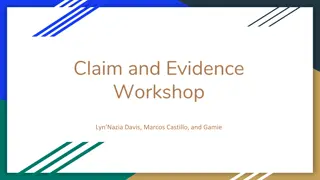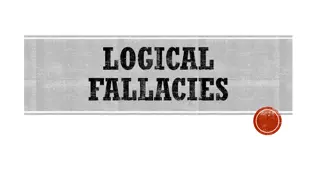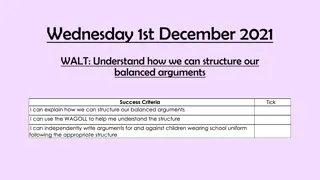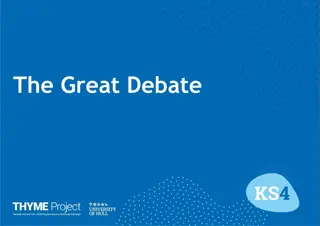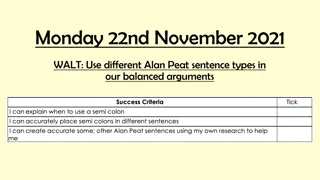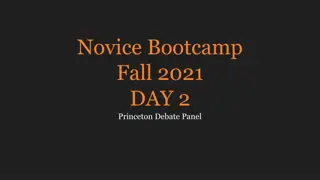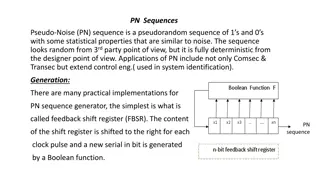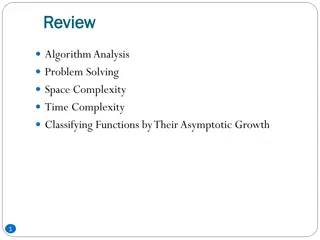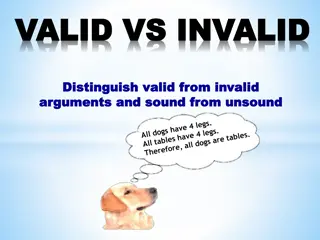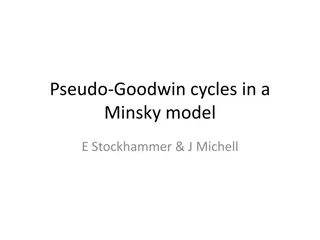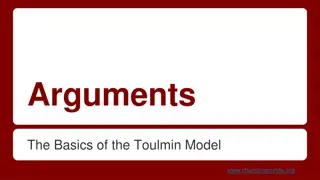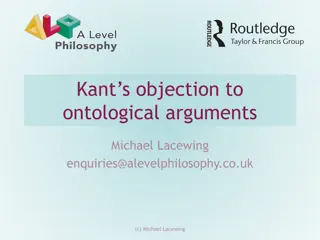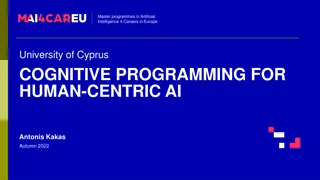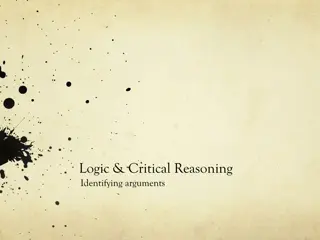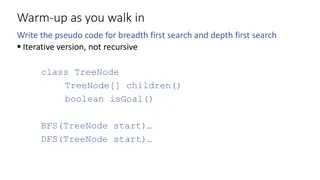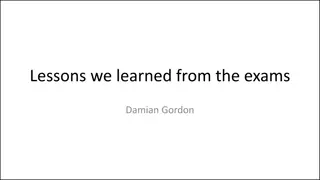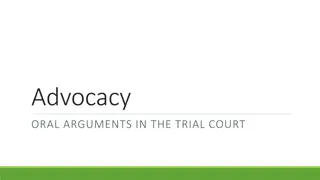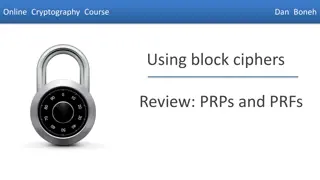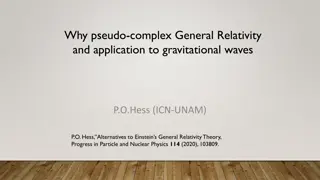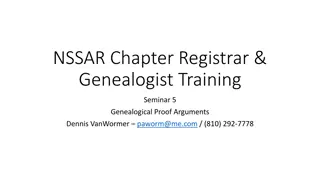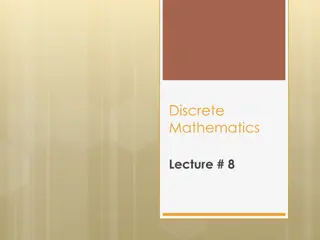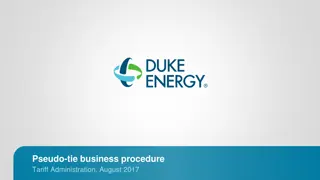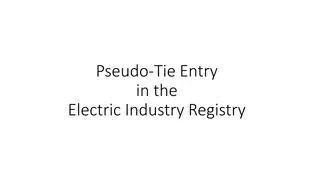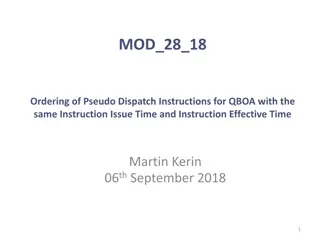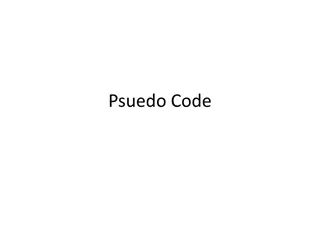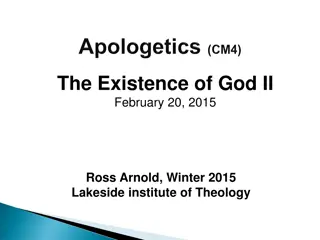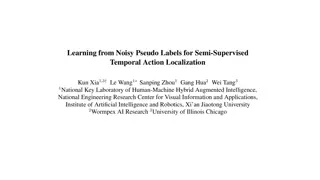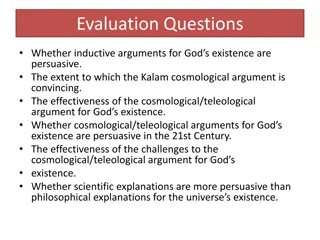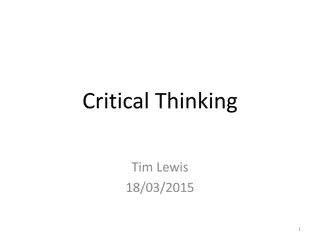Debate on Driving Skills: Are Women Better Drivers Than Men?
In this lesson students examine the debate on whether women make better drivers than men. The essay explores different perspectives, highlighting qualities such as patience and responsibility in women that may contribute to safer driving. Conversely, arguments against women drivers focus on perceive
2 views • 12 slides
Mastering the Toulmin Method for Constructing Persuasive Arguments
Learn how to effectively structure arguments using the Toulmin Method, which consists of Claim, Data, Warrant, Backing, Counterclaim, and Rebuttal elements. Explore reasoning and logic concepts, differentiate between inductive and deductive reasoning, and understand how to construct valid arguments
0 views • 30 slides
Identifying Logical Fallacies: Understanding Poor Reasoning
Logical fallacies are errors in reasoning that can occur in formal or informal arguments. Examples include appeals to authority, appeal to the majority, appeal to pity, and appeal to force. Understanding these fallacies can help in recognizing and avoiding flawed arguments.
0 views • 22 slides
Pseudo-Scientific Ideas About Race and Eugenics in the USA and Australia
The eugenics movement in the USA, under leaders like Charles Davenport, promoted the separation of "inferior" races to prevent genetic contamination of the "superior" groups. Laws like the Virginia Racial Integrity Act enforced racial segregation and punished interracial marriages. This era saw the
1 views • 20 slides
Understanding the Structure of Balanced Arguments
Explore the concept of using the third person in writing balanced arguments to maintain objectivity and structure. Learn about third person pronouns and the importance of being unbiased in your writing. Understand the significance of structuring your arguments and maintaining a clear order for effec
0 views • 11 slides
The Great Bioeconomy Debate: Sustainability, Society, Environment, and Economy
Engage in a thought-provoking discussion on whether the bioeconomy can lead to a sustainable planet. Explore various viewpoints, prepare arguments using facts and opinions, and predict the future success of the bioeconomy. Collaborate as a team to link arguments, address Sustainable Development Goal
0 views • 14 slides
Mastering Quotations in Literary Analysis
Essays in the Literary Tradition sequence often require interpretive analysis arguments, built from articulate and defendable claims. This presentation by Dr. Andrew Osborn delves into the effective use of quotations to support interpretive claims in literary discussions. Learn how to incorporate em
1 views • 53 slides
Mastering Alan Peat's Balanced Arguments with Different Sentence Types
Explore the use of various Alan Peat sentence types in crafting balanced arguments, focusing on incorporating semi-colons effectively. Engage in interactive activities and practice sessions to enhance your skills in creating compelling arguments. Dive into examples and exercises to refine your under
2 views • 12 slides
Mastering Debate: Essential Strategies and Techniques
Learn key concepts like argument structure, points of clarification, and how to make compelling arguments in a debate setting. Discover the importance of warrants, impacts, and implications in formulating strong arguments. Explore tips on coming up with effective arguments and understanding differen
0 views • 47 slides
Understanding Pseudo-Noise Sequences and Applications
Pseudo-Noise (PN) sequences are deterministic yet appear random, with applications in various fields such as communication security, control engineering, and system identification. Generated using shift registers, they exhibit statistical properties akin to noise. Linear and nonlinear feedback shift
1 views • 19 slides
Mastering Final Focus in Debates
Final Focus, a crucial 2-minute speech at the end of a debate, serves as your last chance to persuade the judge of your victory. It involves comparing key voters and emphasizing the impact of your arguments. Weighing key voters is essential, with a focus on demonstrating why the scale tips in your f
1 views • 4 slides
Understanding Reasonable Arguments vs. Pseudo-Arguments
The provided content focuses on distinguishing between reasonable arguments and pseudo-arguments through thought-provoking questions such as the ethical treatment of animals, city subsidies for sports venues, and subjective opinions on aesthetics. It also explains the structure of an argument, highl
0 views • 18 slides
Understanding Pseudo Code and Flow Charts for Algorithm Analysis
Explore the concepts of pseudo code and flow charts for analyzing algorithms, problem-solving, and understanding space and time complexity. Learn about basic elements of pseudo code, assigning operations, and writing effective pseudo code statements in a clear and structured manner. Discover the imp
0 views • 26 slides
Understanding Valid and Invalid Arguments in Logic
In logic, arguments consist of premises supporting a conclusion, with deductive arguments claiming logical necessity. Valid arguments have premises implying the conclusion, making them deductively valid. For example, if all actors are robots and Tom Cruise is an actor, then logically Tom Cruise must
0 views • 25 slides
An Examination of Ontological Arguments for God's Necessary Existence
Various ontological arguments, such as Malcolm's and Anselm's, propose that the existence of God is logically necessary, grounded in the concept of God as the greatest possible being. These arguments challenge the coherence of the concept of God and counter objections, like Kant's claim that existen
2 views • 10 slides
Exploring Pseudo-Goodwin Cycles in a Minsky Model
This paper delves into the dynamics of Pseudo-Goodwin cycles within a Minsky model, examining the counter-clockwise movement of output and wage share. It distinguishes between true Goodwin cycles and pseudo variants, highlighting the role of income distribution, debt, and demand in shaping economic
0 views • 27 slides
Understanding the Toulmin Model for Effective Argumentation
The Toulmin Model provides a structured approach to crafting and evaluating arguments, consisting of key components like claims, grounds/data, and warrants. It emphasizes the importance of using evidence and reasoning to support claims effectively. By understanding this model, one can enhance the pe
0 views • 13 slides
Kant's Critique of Ontological Arguments
An exploration of Kant's objection to ontological arguments, examining the flaws in the reasoning of Anselm and Descartes. Kant argues that existence is not a predicate and does not enhance the concept of a being. Therefore, ontological arguments cannot prove the existence of God solely through conc
0 views • 7 slides
Understanding Argumentation and Realization in AI Master Programmes
Exploring the concept of argumentation and its realization in artificial intelligence master programmes, focusing on the construction, evaluation, and implementation of arguments through cognitive programming. The framework involves structured argumentation, conflict relations, and strength/preferen
1 views • 31 slides
Understanding Logic and Critical Reasoning: Identifying Arguments
In the study of logic and critical reasoning, identifying arguments is a fundamental task. Arguments consist of premises supporting a conclusion, and they can be identified by specific indicators and techniques. Understanding argument structure and types of support, such as deductive and inductive,
2 views • 15 slides
AI Search Algorithms: BFS and DFS Pseudo-code Iterative Version
Explore the iterative versions of Breadth First Search (BFS) and Depth First Search (DFS) with pseudo-code examples implemented for class TreeNode. Understand the concept of TreeNode, children() function, isGoal() method, and apply BFS and DFS starting from TreeNode start.
0 views • 53 slides
Key Learnings from Exams: Algorithm Strategies & Representations
Exploring vital lessons from exams, including algorithm development tips, representation examples, and pseudo-code explanations. Understand the importance of reading questions carefully, creating precise steps, and terminating algorithms effectively. Dive into the world of algorithms, pseudo-code, a
0 views • 44 slides
Guide to Oral Arguments in Trial Court
Learn how to conduct oral arguments in a trial court, including the steps for both the movant and respondent, strategies for making strong arguments, and tips for responding effectively. This comprehensive guide covers the dos and don'ts of oral arguments, emphasizing the importance of preparation,
0 views • 9 slides
Supporters of Slavery in the 19th Century: Legal, Religious, and Economic Arguments
In the 19th century, defenders of slavery utilized legal arguments by denying citizenship rights to blacks, religious arguments by justifying ownership and guidance through biblical references, and economic arguments by comparing treatment of slaves in the South to conditions of workers in the North
0 views • 4 slides
Understanding Command-line Arguments and Errors
Learn how to utilize command-line arguments in Python scripts to enhance flexibility and parametrize functions for various inputs. Explore ways to access and utilize command-line arguments effectively, while handling errors gracefully.
0 views • 30 slides
Understanding Secure PRFs and PRPs in Cryptography
Dive into the world of secure Pseudo-Random Functions (PRFs) and Pseudo-Random Permutations (PRPs) in cryptography. Learn about the definitions, security criteria, and examples of secure PRFs and PRPs such as 3DES and AES. Explore the concepts of secure block ciphers and key principles behind these
0 views • 54 slides
Analyzing Arguments in English Debates: A Critical Approach
Explore and critique various arguments presented in English debates, including topics like dietary recommendations, digestion issues with Japanese rice, and driving skills in different weather conditions. Learn how to evaluate evidence, causality, and persuasiveness in arguments to develop critical
0 views • 19 slides
Mastering Academic Writing Moves: The Art of Summarizing
In academic writing, mastering the art of summarizing is crucial for persuasive arguments. By engaging in dialogue with others and summarizing their arguments, writers can strengthen their position. It is important to strike a balance between the original author's ideas and your own, emphasizing asp
0 views • 15 slides
An Overview of Debate: Propositions, Teams, and Formats
Debate is a regulated discussion between two matched sides discussing a proposition, with the affirmative arguing for change and the negative defending the status quo. The standard debate format involves constructive arguments followed by rebuttals from both sides. The roles in a debate include the
0 views • 47 slides
Exploring Pseudo-Complex General Relativity for Gravitational Waves
Delve into the concept of pseudo-complex General Relativity (PC-GR) as an alternative theory to Einstein's General Relativity. The study considers algebraic extensions, weak field limits, and the extension of metrics in momentum-energy space. By analyzing predictions and implications, this research
0 views • 21 slides
Genealogical Proof Arguments and SAR Standard of Proof
This detailed content covers the definitions and components of genealogical proof arguments, proof summaries, and the SAR standard of proof. It explains the importance of evidence quality, source citations, and analysis in establishing acceptable genealogical conclusions for SAR membership applicati
0 views • 22 slides
Understanding Valid and Invalid Arguments in Discrete Mathematics
Concepts of valid and invalid arguments in discrete mathematics are explored through examples. Learn how to determine the validity of arguments based on premises and conclusions. Practice using truth tables to evaluate argument forms. Enhance your logical reasoning skills in Discrete Mathematics.
0 views • 22 slides
Pseudo-Tie Business Procedure Tariff Administration, August 2017
Pseudo-tie business procedure tariff administration from August 2017 outlines the purpose, implementation, and types of pseudo-ties in the energy industry. It covers dynamic transfers, pseudo-tie procedures, and various stakeholder involvements. The document details the process of implementing pseud
0 views • 11 slides
Understanding Pseudo-Tie Entry in Electric Industry Registry
Explore the requirements and measures of NERC Standard INT-004-3.1 for dynamic transfers in the electric industry. Learn about data fields required for pseudo-tie entry and approval methodology in the Electric Industry Registry. Discover the publishing schedule for EIR entries and the approval proce
0 views • 6 slides
Ordering of Pseudo Dispatch Instructions for QBOA
This document outlines the specific order in which Pseudo Dispatch Instructions (DIs) are to be arranged for QBOA in scenarios where multiple instructions are issued simultaneously. The order prioritizes certain instructions to maintain consistency and alignment with system implementation rules.
0 views • 11 slides
Understanding Pseudo Code: A Beginner's Guide to Organizing Programs
Pseudo code is a helpful way to organize your program logic before actual coding. It provides a structured outline from inputs to outputs, focusing on step-by-step guidelines that are not language-specific. This guide covers the basics of pseudo code, including general guidelines, steps to pseudo co
0 views • 29 slides
Philosophical Apologetics: Arguments for the Existence of God
Philosophical apologetics presents various arguments for the existence of God, including the ontological, cosmological, teleological, moral, transcendental, and presuppositional arguments. These arguments cover diverse aspects such as change, causality, design, contingency, miracles, consciousness,
0 views • 10 slides
Handling Label Noise in Semi-Supervised Temporal Action Localization
The Abstract Semi-Supervised Temporal Action Localization (SS-TAL) framework aims to enhance the generalization capability of action detectors using large-scale unlabeled videos. Despite recent progress, a significant challenge persists due to noisy pseudo-labels hindering efficient learning from ab
0 views • 30 slides
Evaluating Arguments for God's Existence in the 21st Century
Exploring the persuasiveness of inductive arguments for God's existence, assessing the Kalam cosmological argument, and evaluating the effectiveness of cosmological/teleological arguments. Delving into whether scientific explanations surpass philosophical ones, the strengths and weaknesses of these
0 views • 16 slides
Understanding Critical Thinking, Hypotheses, and Arguments
Explore the concepts of critical thinking, hypotheses, and arguments in this informative content. Learn about the definition of hypotheses, the nature of arguments, and syllogisms. Delve into the world of logical reasoning and the foundations of thought processes.
0 views • 32 slides

